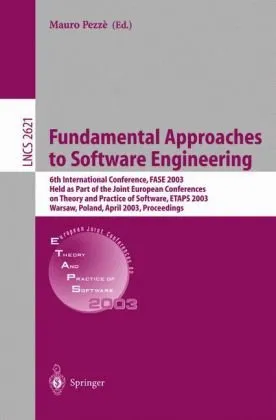Fundamental Approaches to Software Engineering: 6th International Conference, FASE 2003 Held as Part of the Joint European Conferences on Theory and Practice of Software, ETAPS 2003 Warsaw, Poland, April 7–11, 2003 Proceedings
4.5
بر اساس نظر کاربران

شما میتونید سوالاتتون در باره کتاب رو از هوش مصنوعیش بعد از ورود بپرسید
هر دانلود یا پرسش از هوش مصنوعی 2 امتیاز لازم دارد، برای بدست آوردن امتیاز رایگان، به صفحه ی راهنمای امتیازات سر بزنید و یک سری کار ارزشمند انجام بدینمعرفی کتاب
کتاب Fundamental Approaches to Software Engineering در ششمین کنفرانس بینالمللی FASE 2003 که بهعنوان بخشی از مجموعه کنفرانسهای مشترک اروپایی نظریه و عمل نرمافزار (ETAPS) برگزار شد، ارائه شده است. این کنفرانس در سپتامبر 2003 در شهر ورشو، لهستان، برگزار گردید و مجموعه مقالات و پژوهشهای ارائهشده در این مجموعه، دیدگاههای نوآورانهای را در زمینههای کلیدی و بنیادی Software Engineering ارائه میدهد. هدف اصلی این کتاب و کنفرانس، برجستهسازی روشهای نوین در توسعه، طراحی، و ارزیابی نرمافزارها با تمرکز بر نظریه و کاربردها است.
خلاصه کامل کتاب
این کتاب، بهعنوان بخشی از سری کنفرانسهای ETAPS، مرجعی جامع و قابلاعتماد برای تمامی متخصصین نرمافزار و پژوهشگران در این زمینه است. مباحث موجود در این مجموعه به چهارچوبهای نظری، متدولوژیهای تجربی، ابزارهای کاربردی، و همچنین تحقیقات کاربردی در دنیای واقعی پرداخته است.
یکی از موضوعات اصلی این کتاب، بررسی روشهای مختلف برای فهم بهتر چگونگی ساخت software systems پیچیده است. از مفاهیم بنیادی مانند تحلیلهای فرمال روی system specifications گرفته، تا تکنیکهای پیشرفته مانند model checking و formal verification، همه به صورت دقیق بررسی شدهاند. علاوهبراین، توجه ویژه به تغییرات و تکنولوژیهای نوآور در معماریهای نرمافزاری، تاکید آن بر روشهای تطبیقپذیر برای روند توسعهی نرمافزار نیز از دیگر نقاط قوت این کتاب است.
نتایج کلیدی
- ارائه مدلهای پیشرفته برای تحلیل و بررسی صحت و دقت سیستمهای نرمافزاری
- استفاده از جدیدترین فناوریها در software verification و validation
- شناسایی و تعریف ابزارهای جدید برای تولید کدهای باکیفیت و کاهش احتمال خطاها
- ایجاد درک بهتر از معماری سیستمها و چرخههای حیات نرمافزار
- پیشبرد همکاری بین محققین نظری و متخصصین صنعتی برای حل مشکلات واقعی
جملات معروف از کتاب
"Understanding the foundations of Software Engineering allows engineers to create more efficient, reliable, and adaptable systems."
"Modern software development relies not just on coding skills, but on structured frameworks to ensure correctness and sustainability."
چرا این کتاب مهم است؟
کتاب Fundamental Approaches to Software Engineering بهعنوان یک منبع معتبر دانشگاهی و صنعتی، اهمیت ویژهای برای توسعهدهندگان، محققین، و دانشجویان دارد. نوآوریهای مطرحشده در این جلد، پایهای برای پیشرفت آیندهی مهندسی نرمافزار ایجاد کرده و اهمیت مفاهیمی مانند formal methods، اتوماسیون، و رویکردهای ترکیبی را بهخوبی نشان میدهد.
با تمرکز بر چالشهای واقعی در صنعت نرمافزار، این کتاب الگویی برای حل مسائل پیچیده و بهینهسازی فرآیندها به شمار میآید. برای کسانی که میخواهند دانش خود را در زمینه تکنیکهای پیشرفته توسعه نرمافزار گسترش دهند، مطالعه این کتاب توصیه میشود. علاوهبراین، ارائه رویکردهای ترکیبی نظری و عملی نشاندهنده مسیر مطلوب توسعه نرمافزار در سالهای آینده است.
Introduction to "Fundamental Approaches to Software Engineering"
Software engineering is a cornerstone of modern technology, driving innovation and progress across a wide range of industries. "Fundamental Approaches to Software Engineering: 6th International Conference, FASE 2003" captures groundbreaking research and pivotal discussions from the conference held in Warsaw, Poland, as part of the Joint European Conferences on Theory and Practice of Software (ETAPS). This collection of proceedings represents not just the state of the art at the time but also insights into techniques and methodologies that continue to influence software engineering practices today.
Detailed Summary of the Book
The book compiles a variety of research papers and discussions from FASE 2003, offering a multidimensional perspective on software engineering. It provides innovative theories, rigorous formal methods, and practical approaches aimed at solving persistent challenges in software design, implementation, and maintenance. The topics cover a broad range of software engineering domains, including but not limited to:
- Model-driven development and architecture-centric design methodologies.
- Program analysis and verification techniques for improving code reliability.
- Formal methods for specification and testing of software systems.
- Innovative tools and frameworks for improving software development processes.
A special emphasis is placed on bridging the gap between theoretical insights and applied strategies, making this book a valuable resource for both academics and practitioners. The proceedings also explore the integration of emerging technologies and principles into software engineering workflows, highlighting the synergy between theory and practice.
Each chapter is meticulously curated to represent diverse perspectives, reflecting the collaborative and interdisciplinary nature of software engineering research. From pragmatic applications to conceptual frameworks, readers will find a wealth of information that enhances their understanding of how software systems are built and maintained.
Key Takeaways
This book serves as a comprehensive guide for software engineers and researchers aiming to expand their knowledge and refine their craft. Here are some of the key takeaways:
- The interplay between theory and practice is crucial for advancing software engineering; emerging theoretical constructs must align with real-world applications.
- Formal methods and automation tools are vital for verifying and ensuring the reliability of modern software systems, especially in safety-critical domains.
- Collaborative and interdisciplinary approaches can significantly enhance software development processes, leading to more robust and efficient outcomes.
- Model-driven and architecture-centric strategies can help streamline complex software projects, making them more manageable and adaptable.
- Software engineering is an ever-evolving discipline that benefits immensely from both academic research and industrial feedback.
Famous Quotes from the Book
One of the distinct features of this book is its ability to interweave thoughtful insights with technical content. Here are a few notable quotes from the proceedings:
"Formal methods are not merely abstract exercises; they are tools for envisioning and realizing systems where correctness is paramount."
"Software engineering is not just about crafting code; it's about architecting solutions that endure complexity and change."
"Collaboration between academia and industry is no longer a luxury; it is a necessity for driving innovation and solving real-world challenges."
Why This Book Matters
The significance of "Fundamental Approaches to Software Engineering" lies in its holistic approach to addressing software engineering challenges. At a time when software systems were becoming indispensable to industries ranging from healthcare to finance, this book provided a roadmap for bridging the gap between theoretical rigor and practical applicability.
Aspiring and seasoned professionals alike will benefit from its emphasis on methodologies that are not only innovative but also sustainable and scalable. Additionally, educators will find this book a key resource for exposing students to some of the most critical concepts and challenges in software engineering. Its thought-provoking discussions and detailed research contributions cater to a global audience, making it a timeless reference in the field.
Ultimately, this book encapsulates the spirit of the ETAPS 2003 conference: fostering collaboration, advancing knowledge, and building a stronger foundation for the future of software engineering. By remaining relevant and insightful, it underscores the role of academic and industrial collaboration in shaping modern technology.
دانلود رایگان مستقیم
شما میتونید سوالاتتون در باره کتاب رو از هوش مصنوعیش بعد از ورود بپرسید
دسترسی به کتابها از طریق پلتفرمهای قانونی و کتابخانههای عمومی نه تنها از حقوق نویسندگان و ناشران حمایت میکند، بلکه به پایداری فرهنگ کتابخوانی نیز کمک میرساند. پیش از دانلود، لحظهای به بررسی این گزینهها فکر کنید.
این کتاب رو در پلتفرم های دیگه ببینید
WorldCat به شما کمک میکنه تا کتاب ها رو در کتابخانه های سراسر دنیا پیدا کنید
امتیازها، نظرات تخصصی و صحبت ها درباره کتاب را در Goodreads ببینید
کتابهای کمیاب یا دست دوم را در AbeBooks پیدا کنید و بخرید
1144
بازدید4.5
امتیاز50
نظر98%
رضایتنظرات:
4.5
بر اساس 0 نظر کاربران
"کیفیت چاپ عالی بود، خیلی راضیام"
Questions & Answers
Ask questions about this book or help others by answering
No questions yet. Be the first to ask!


